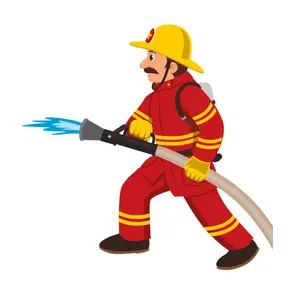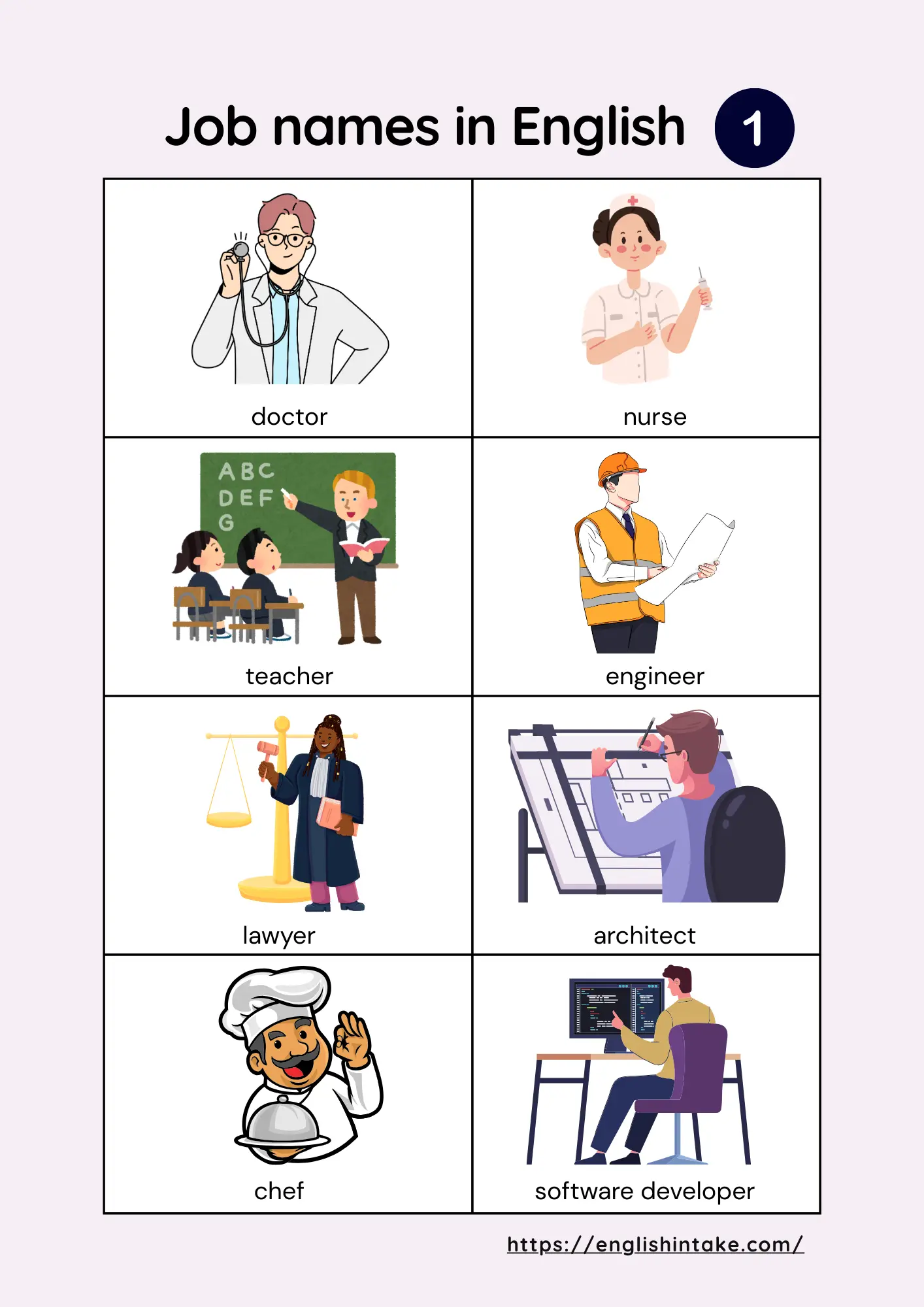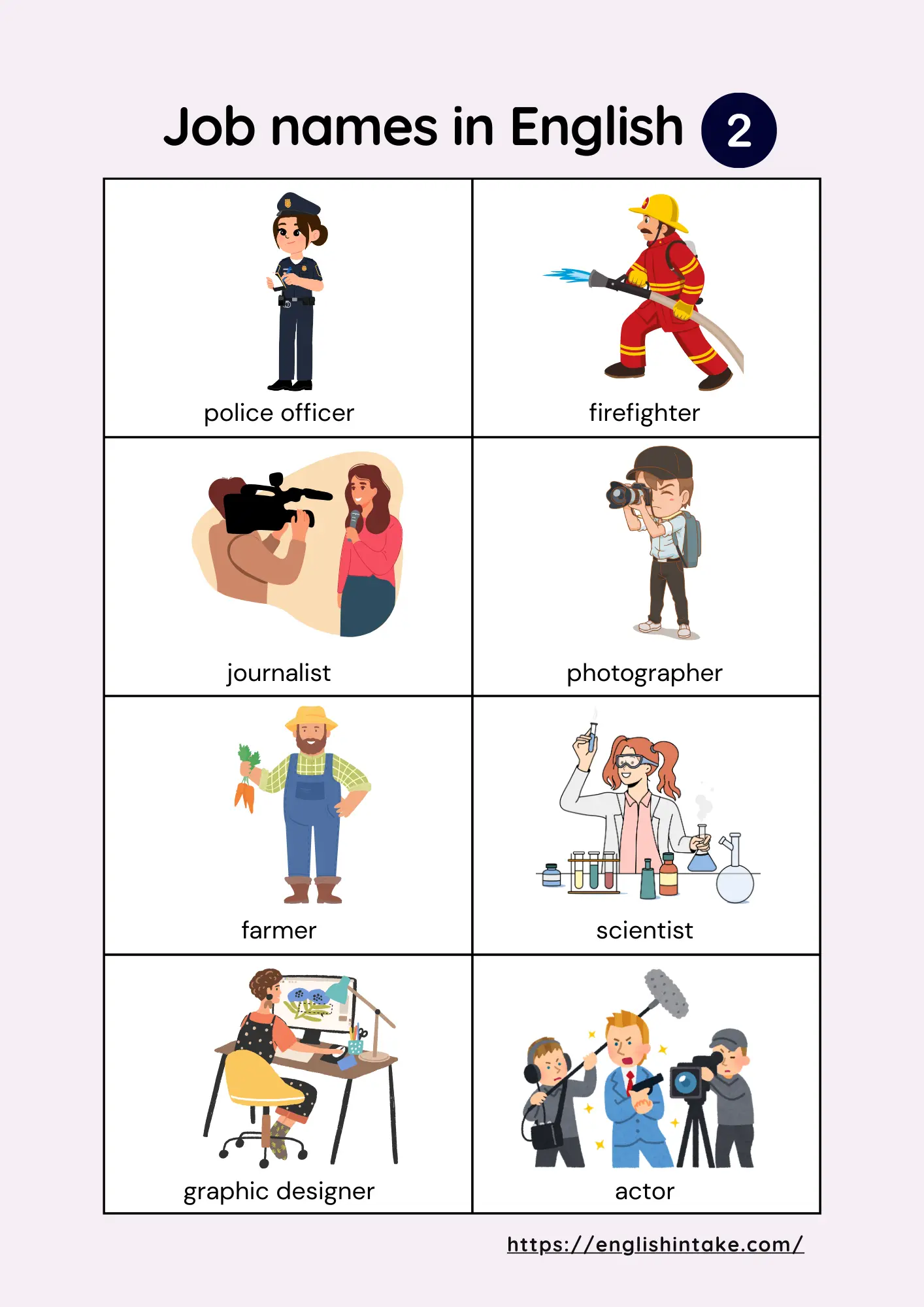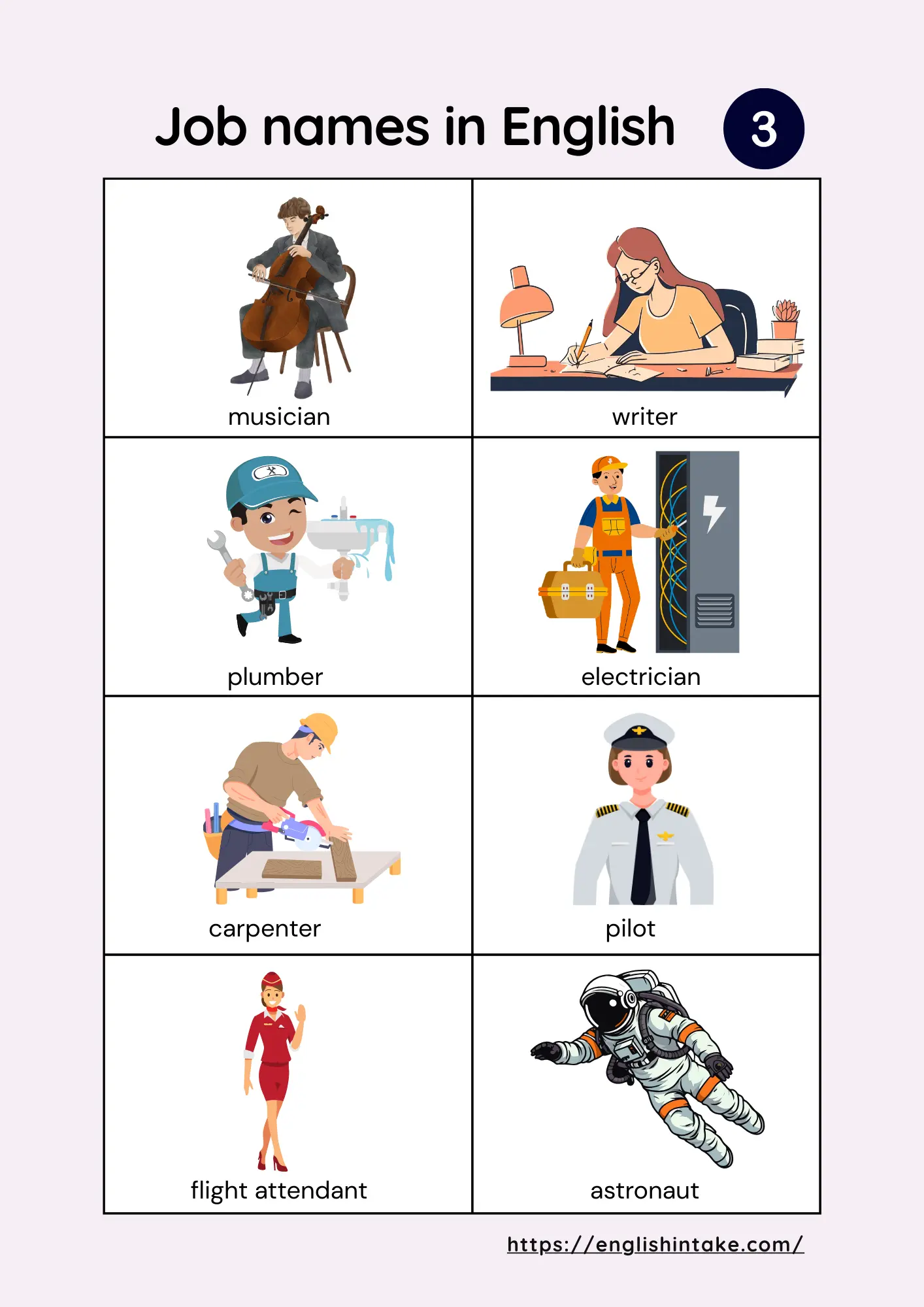Learn job names in English with pictures and example sentences to help you remember new vocabulary and use it in real conversations.
1. What is a job?
A job is what a person does to earn money for a living.
2. Names of jobs in English




Doctors and nurses help people stay healthy. They treat you when you are sick. They can monitor your health and give you advice to keep you well.




Architects design the homes, schools, and offices that we use every day. They draw plans that show how the different parts of a house or building should be built to make them safe and beautiful.




Firefighters help keep people safe during fires and other emergencies. They also teach safety and are trained to act quickly in dangerous situations.




A graphic designer creates visual content for advertisements, websites, social media, books, etc. They use colours, shapes, images, and text to design posters, logos, websites, and more.




Plumbers fix sinks, toilets, showers, leaking taps, etc. They ensure that water systems work safely in homes and buildings.




Carpenters use different tools to make and assemble wooden structures. They follow design plans to ensure everything fits perfectly.
3. Different types of jobs
permanent joban employee is hired for an indefinite period.
temporary jobemployees are hired for a specific period, which could be a few days, weeks, or months. This is common for seasonal work, such as holiday retail jobs.
contract jobThis is similar to a temporary job, but it typically involves a specific project or task with a defined end date.
part-time jobThis type of job involves fewer hours per week than a full-time job. Part-time jobs often offer flexibility and are popular among students, parents with young children, and retirees.
full-time joban employee works a minimum number of hours defined as such by their employer. In most cases, full-time jobs are at least 35 to 40 hours per week.
freelance jobFreelancers are self-employed individuals who offer their services to clients. They often work on multiple projects at once and have a high degree of flexibility in their schedules.
internshipa temporary job, usually part-time, that is typically held by students or young professionals looking to gain experience in a particular field.
casual jobhas no guaranteed hours of work. The employee usually works on an as-needed basis.
shift workrequires employees to work during different parts of the day or night, usually in rotation with other employees.
remote jobemployees can work from anywhere, typically using technology to complete their tasks and communicate with their team.
4. Talking about professions and employment status
There are different expressions to talk about professions and employment situations in English.
What do you do for a living?This is a polite way to ask someone about their job or profession.
I work in...You can use this phrase to talk about the field or industry where you work.
I work in healthcare.
I am a/an...This is a straightforward way to state your job title.
I am a teacher.
My job involves...You can use this phrase to describe what you do at your job.
My job involves managing a team of designers.
I’m in charge of...This phrase can be used to talk about your responsibilities at work.
I’m in charge of sales in my company.
I’m self-employed.You can say this if you work for yourself instead of for a company.
I run my own business.This phrase is used by people who have their own businesses.
I work for...Use this phrase to specify the company or person you work for.
I work for Google.
I’m between jobs.This is a way to say that you’re currently unemployed or looking for a new job.
I’m retired.This means you have stopped working, usually because of age.
I’m training to be a/an...Use this phrase if you’re studying or learning skills for a specific job.
I’m training to be a pilot.
I’m looking for a job in...You can use this phrase when you’re searching for a job and want to specify the field or industry.
I’m looking for a job in marketing.
I got promoted to...This phrase is used when you’ve been given a higher position or rank in your job.
I got promoted to Manager.
5. Jobs vocabulary
5.1 Describing professional situations
Here are some common adjectives that can be used to describe professional situations.
employedWhen you are employed, it means you have a job.
He is employed as a software engineer at a local company.
unemployedBeing unemployed means you don’t have a job.
After the factory closed, many workers became unemployed.
self-employedIf you are self-employed, you work for yourself instead of a company or someone else.
She is self-employed and runs her own graphic design business.
underemployedWhen you are underemployed, you do not have enough work to do or you have a job that does not match all the skills you have learned.
Despite having a degree in literature, he’s underemployed, working part-time at a bookstore.
retiredYou are retired when you have stopped working, usually due to old age.
My parents are retired and spend their time travelling.
voluntaryWhen you do voluntary work, you do it willingly without receiving anything in return.
He does voluntary work at the local food bank.
joblessNot having a job.
The economic downturn left many people jobless.
out of workCurrently not employed.
He’s been out of work since the restaurant closed.
salariedReceiving a fixed amount of money regularly as payment for work.
She is a salaried employee in a nearby factory.
hourlyHourly workers get paid for each hour of work.
He’s an hourly worker and gets paid overtime if he works more than 40 hours in a week.
involuntary part-timeWorking fewer hours than desired due to the unavailability of full-time work.
Despite wanting full-time work, she’s been stuck in an involuntary part-time job.
displacedRemoved from a job, usually due to changes in the industry or economy.
The displaced workers were given severance packages and help to find new jobs.
hiredSelected by an employer to do a job, usually through an interview process.
She was hired as a project manager at a construction company.
firedDismissed from a job by an employer.
He was fired from his job for consistently being late.
laid offWhen you are laid off, you are stopped from being employed, often because of company cutbacks.
The company had to lay off several employees due to budget cuts.
5.2 Common words and expressions related to work and employment
dismissTo dismiss someone from a job means to let them go because of certain reasons.
The company had to dismiss several employees due to budget cuts.
applicationAn application is a formal request, often in writing, for something such as a job or course of study.
She sent her application for the job last week.
employerAn employer is a person or organisation that hires people to do work.
The employer decided to give everyone a raise.
resignTo resign means to voluntarily leave a job or position.
He decided to resign from his position as manager.
sick leaveSick leave is time off given by the company to allow employees to recover from an illness.
She took a week of sick leave to recover from the flu.
internAn intern is a student or trainee who works, sometimes without pay, in order to gain work experience or satisfy requirements for a qualification.
Jane is working as an intern at a local law firm this summer.
fireTo fire someone means to dismiss them from their job, often due to unsatisfactory performance.
After repeated warnings, the manager had no choice but to fire him.
personnel officerA personnel officer is a person who manages issues related to employees in an organisation, such as hiring, training, and administration.
The personnel officer is responsible for hiring new staff members.
recruitTo recruit means to find suitable people and get them to join a company, an organisation, the armed forces, etc.
The army is trying to recruit more young people.
salaryA salary is the amount of money that an employee is paid each year for their job.
She earns a good salary as an engineer.
redundantBeing redundant means losing your job because your employer no longer needs the work you do.
Many factory workers became redundant after the new automation technology was introduced.
personnelPersonnel refers to the people who are employed in an organisation or business.
The personnel department manages all issues related to staff.
PromotedBeing promoted means moving to a higher level or position in your job.
After working hard for two years, he was promoted to a managerial role.
redundancy payRedundancy pay is money that a company must pay to an employee who is made redundant.
He received generous redundancy pay after being laid off.
shiftworkShiftwork is a system of employment where an individual's work period is less than 24 hours and workers are scheduled to work at different times.
Nurses often have to do shiftwork, working at different times of the day or night.
bonusA bonus is an extra amount of money that is given to an employee, in addition to their normal salary.
She received a bonus at the end of the year for her outstanding performance.
curriculum vitaeA curriculum vitae (CV) is a written summary of one's education, work experience, and other qualifications. It is often used when applying for jobs.
He sent his curriculum vitae to several companies in hopes of finding a job.
prospectsProspects refer to the possibilities of future success in a job or career.
The prospects for advancement in this company are very good.
retireTo retire means to stop working permanently, usually because of old age.
My father plans to retire next year when he turns 65.
assessmentAn assessment is a process of making a judgement or forming an opinion about something or someone, usually in the workplace to evaluate job performance.
The manager will do an assessment of every employee's performance at the end of the year.
noticeA notice is a formal declaration from an employee informing an employer that they will quit their job after a certain period of time.
He handed in his two weeks' notice and decided to look for another job.
backgroundIn the context of jobs, a background refers to a person's experience, qualifications, and education.
She has a strong background in marketing which makes her suitable for this role.
full-timeA full-time job is a job that requires working the full number of hours considered normal or standard by the employer, typically 40 hours per week.
She works full-time as a nurse in a local hospital.
apprenticeshipAn apprenticeship is a system where a person learns a job by working for a person in a specific field.
He started his career with an apprenticeship in carpentry.
flexitimeFlexitime is a system of work that allows employees to choose, within certain limits, the hours for starting and leaving work.
Many employees appreciate the flexitime system as it helps balance their work and personal life.
employeeAn employee is a person who is hired to work for another person or business in exchange for compensation.
As an employee, she is entitled to certain benefits such as health insurance and paid time off.
apprenticeAn apprentice is a person who works for an employer in a skilled job for a fixed period in order to learn the particular skills needed in their job.
She's an apprentice carpenter with a local construction company.
skeleton staffSkeleton staff means the smallest number of people needed for a business or organisation to operate effectively.
The store will be operated by a skeleton staff on public holidays.
overtimeOvertime refers to time worked beyond the regular hours.
He often works overtime to meet project deadlines.
interviewAn interview is a formal meeting at which someone is asked questions in order to find out if they are suitable for a job or a course of study.
He has an interview for a new job tomorrow.
internshipAn internship is a temporary position with an emphasis on on-the-job training rather than merely employment.
She did an internship at a law firm over the summer.
maternity leaveMaternity leave is a period of time that a mother takes off from work following the birth of her baby.
She's on maternity leave until the end of the summer.
staffStaff refers to all the people who work for a particular company or organisation.
The staff are very friendly and helpful at the hotel.
hireTo hire means to give work or a job to someone in exchange for wages or a salary.
The company is planning to hire 50 new employees this year.
payslipA payslip is a piece of paper given to an employee to show how much they have earned and any deductions like taxes and insurance.
He checked his payslip to see the amount of tax deducted.
fringe benefitsFringe benefits are extra benefits supplementing an employee's salary, for example, a company car, health insurance, etc.
His fringe benefits include health insurance and a company car.
6. Learning materials



